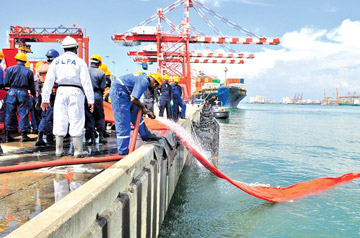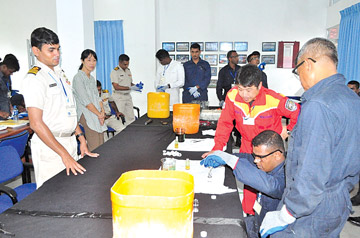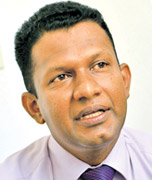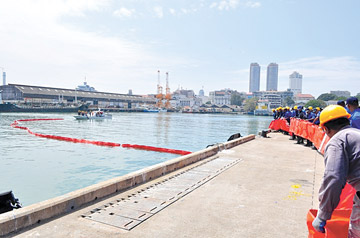Seas around Sri Lanka vulnerable to oil spills
by Ranil Wijayapala
The sea around Sri Lanka is highly vulnerable to an oil spill, as
twenty-five percent of the world’s oil transportation, which runs up to
550 million tons per annum, passes via Sri Lanka’s exclusive economic
zone.
Though Sri Lanka had not faced huge disasters due to oil spills in
Sri Lankan waters, except for a few incidents which were reported around
the country during the past few decades, the risk of an oil spill is
high around Sri Lanka.
 According to the reported incidents of oil spills around Sri Lanka,
the most prominent oil spill was reported in August 1999 when MV
Meliksha which was carrying 16,500 mt fertiliser and about 200 mt of
heavy fuel oil was reported in distress off Dondra with head sinking. According to the reported incidents of oil spills around Sri Lanka,
the most prominent oil spill was reported in August 1999 when MV
Meliksha which was carrying 16,500 mt fertiliser and about 200 mt of
heavy fuel oil was reported in distress off Dondra with head sinking.
The crew was rescued by a passing by vessel and the master abandoned
the vessel out side the territorial waters of Sri Lanka.
The vessel continued to sink and drift away from the coast of Sri
Lanka into deep waters. Sri Lanka based salvage company, Sri Lanka
Shipping Ltd had taken the abandoned vessel and anchored if off the
coast of Hambantota.
It was reported that that MV Melishka ran aground about 1,000 m of
Bundala coast following the grounding the vessel had broken up and the
reports show that the fuel and the fertiliser released to the sea caused
damage to the marine environment.
In 2006, the MV Amanat Shah carrying teak logs from Burma to
Bangladesh developed engine trouble and sank 11 kms off Koggala, causing
a hazardous oil-spill of 25 metric tons and releasing over 800 logs into
the sea.
Marine traffic
According to maritime experts though Sri Lanka has faced few such
incidents a potential threat of oil spill does exist in Sri Lanka waters
as a total of some 525 million tonnes of oil is transported in tankers,
for a year within the EEZ and close to out side of this zone.
The density of marine traffic in Sri Lanka’s coastal waters is high
as Sri Lanka, borders the main East-West shipping route used by ships
sailing to and from the industrial centres of the Far East and the
West.,
The vulnerability of oil spills is also high as crude oil imported to
Sri Lanka is pumped to the Ceylon Petroleum Corporation’s land based
storage tanks via an under-sea pipeline from the offshore single point
buoys mooring off the port of Colombo.
The terminal is operated through-out the year, even during monsoon
period and approximately two tankers carrying 120,000 tonne parcels of
crude oil are transferred to the tanks ashore every month.
|

Japanese experts train Coast Guard personnel |
According to marine pollution prevention experts the operations of
Trincomalee Oil Tank Farm, the expansion and development of ports and
new constructions of ports and the existing marine services industry,
including offshore supply of bunkers and ship repairing industry will
further increase the vulnerability for oil spills around Sri Lanka.
With Sri Lanka carrying out oil exploration in the Mannar basin, the
potential threat will be further increased.
Japanese help
The Marine Environment Protection Authority (MEPA), the apex body
which was set up under the Marine Pollution Prevention Act No. 35 of
2008 is responsible for the prevention of marine pollution and related
activity and it bears the sole responsibility to prevent, control, and
manage the pollution of Sri Lanka’s Marine Environment. National Oil
Spill Contingency Plan (NOSCOP) which has been formulated by the
institution is now being implemented with other stakeholder agencies as
a response to any unexpected oil spill.
Considering Sri Lanka’s vulnerability for such an oil spill and its
lesser preparedness towards facing such a calamity the Japanese
Government has come forward to assist Sri Lanka to manage such situation
by providing training and the equipment.
The Sri Lanka Coast Guard as an stakeholder in protecting the coastal
belt of Sri Lanka and preventing and minimizing marine pollution, took
the opportunity to undergo a training program for its cadre with the
assistance of Japanese marine environment protection and oil spill
measures experts headed by Lt Commander Tanaka and Lt. Sasaki Japanese
from the National Strike team of Japan Coast Guard.
According to Captain Indunil Ratnayake, the Security Advisor to the
Japanese Embassy in Colombo along with the Japan International
Cooperation Agency the Coast Guard cadres from Sri Lanka undergone this
training from January 25 to February 18, 2015.
Japan has good diplomatic relations with Sri Lanka for 62 years to
properly equip the country to manage oil spills is noteworthy as Sri
Lanka is heavily dependent on the tourism and fishing industry, he said.
Poorly equipped
“Many people in the coastal belt depend on the tourism industry and
on the fisheries industry in the country.
If we are faced with such oil spill disaster the country will face an
economic calamity as such oil spill which can made a huge impact on the
livelihood of the people,” he added. Oil spills include release of crude
oil from tankers, offshore platforms, drilling rigs and wells and spills
of refined petroleum products (such as gasoline, diesel) and its
by-products and heavier fuels used by large ships such as bunker fuel,
or the spill of any oily white substance or waste oil and spills may
take months or even years to clean up.
“Although we are an island nation we have not given top priority on
managing oil spills in our territorial waters. Though we have
institutions to manage such oil spills they are poorly equipped to
handle large-scale oil spills.
|

Captain Indunil Ratnayake |
Although the Colombo Port has a little equipment to handle oil spills
within the harbour limits, managing an oil spill in the mid sea close to
Sri Lanka is difficult for them.
They have to bring equipment from India to handle such situations. By
the time the equipment are brought to Sri Lanka the oil spill may have
spread widely in the sea,” he added.
Considering all the aspects, Sri Lanka has to face in the event of an
oil spill, and as a country which has specialised in managing oil spills
due to frequent mishaps in Japan and the Asian region, Japan decided to
provide equipment and training to manage such oil spills.
JICA
Japanese expert team headed by Lt Commander Tanaka and Lt. Sasaki oil
spill measures experts from the National Strike team of the Japanese
Coast Guard conducted the two weeks training for the Sri Lanka Coast
Guard personnel with the cooperation extended by JICA in Sri Lanka. The
training was conducted at Mirissa Coast Guard Headquarters.
“During the training sessions six officers and 30 other ranks from
the Sri Lanka Coast Guard were given theoretical and practical knowledge
using the models of the equipment the Japanese government is going to
donate to Sri Lanka Coast Guard in the future,” Captain Ratnayake added.
At the next stage the Japanese Government will present over 13
containers with new equipment to manage oil spills to the Sri Lanka
Coast Guard enabling them to use them in the event of an oil spill in
the sea around Sri Lanka.
“We are now prepared to face a tsunami after we had the worst
experience in the history of our country following the tsunami in
December 2004.
 Since oil spills take place frequently in other countries such as
Japan they are well prepared to face such eventualities. Since they are
properly equipped and trained they know how to react to the situation
immediately. Since oil spills take place frequently in other countries such as
Japan they are well prepared to face such eventualities. Since they are
properly equipped and trained they know how to react to the situation
immediately.
Therefore, this training program came handy for the Sri Lanka to
manage oil spills,” he added.
The training program has resulted due to the agreement signed between
Japan and Sri Lanka on Maritime Cooperation and Japan will further
assist Sri Lanka Coast Guard by donating two brand new vessels for the
Coast Guard.
“A Japanese team had made an assessment report about the required two
vessels for the Sri Lanka Coast Guard considering its operational
centres, its needs and ability to maintain vessels before the deciding
on the type of vessels they are going to donate Sri Lanka,” he said.
Director, Coast Guard, Rear Admiral S. S. Ranasinghe and Deputy
Director General of the Sri Lanka Coast Guard, Commodore Samarasinghe
said that they were happy to receive such training.
“We have not yet properly concentrated on this subject as Sri Lanka
had not faced a huge disaster of this nature as yet.”
Sri Lanka as a maritime hub in the Asian region should welcome such
training programs as it will help to keep Sri Lanka in top position in
its preparedness to manage oil spills in the regional level also. |

